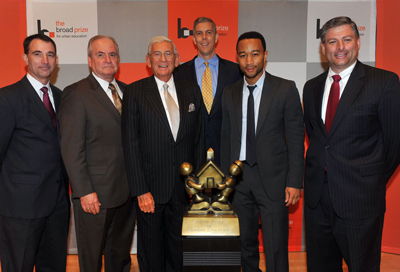
Charlotte-Mecklenburg Schools representatives, with Eli Broad, U.S. Secretary of Education Arne Duncan and John Legend (Photo by Broad Foundation)
Calling the Charlotte-Mecklenburg Schools “a model for innovation in urban education,” U.S. Secretary of Arne Duncan announced the North Carolina district today as the 2011 winner of the Broad Prize for Urban Education.
Duncan highlighted Charlotte-Mecklenburg’s success in narrowing achievement gaps faster than any other district in North Carolina, and noted that it has begun sending the district’s best teachers to its most struggling schools.
The Eli and Edythe Broad Foundation, which will give Charlotte-Mecklenburg $550,000 toward college scholarships for high-school seniors, said that the district — a finalist twice before, in 2004 and 2010 — won in part because it reduced the achievement gap in high-school reading between African-American and white students by 11 percentage points from 2007 to 2010. Also, sixty-two percent of the district’s African-American seniors took the SAT this past school year, the highest percentage among all 75 urban school districts eligible for the prize.
But Charlotte-Mecklenburg has had its share of struggles between the April announcement of the four finalists, which included Broward and Miami-Dade Counties in Florida and the Ysleta District in El Paso, and today’s prize.
Reports in July said that Charlotte-Mecklenburg failed dismally in meeting its academic targets for the 2010-2011 school year. Emily Dalesio of the Associated Press wrote on July 21 that “preliminary schoolhouse data show fewer than three of 10 Charlotte-Mecklenburg Schools met the targets set for them in the academic year that concluded in June.”
And in June, Newsweek’s list of America’s Best High Schools had only two Charlotte schools on it, down from 13 last year. (Newsweek used stricter criteria this year, which might help explain the drop.)
This all came shortly after Charlotte-Mecklenburg superintendent Peter Gorman — who oversaw the district’s upward climb — left for a position in the News Corp.’s newly minted Education Division.
Charlotte was the birthplace of mandated desegregation busing in 1969, which lasted until 2001 and yielded largely positive results.
The three runners-up — each of which has been a finalist before — will receive $150,000 in scholarship money for their seniors. Highlights from these districts:
— In Broward, the achievement gap in reading and math was “near the smallest in Florida,” according to Duncan.
— In Miami-Dade, Duncan applauded its “online data warehouse,” where “data is the basis for every conversation.”
— In the Ysleta district, located on the Texas-Mexico border, 84 percent of all seniors took the SAT, the highest of the 75 districts eligible for the prize. Schools there also pay for students to take the PSAT and begin talks with parents about the SAT when their children are in sixth grade.



